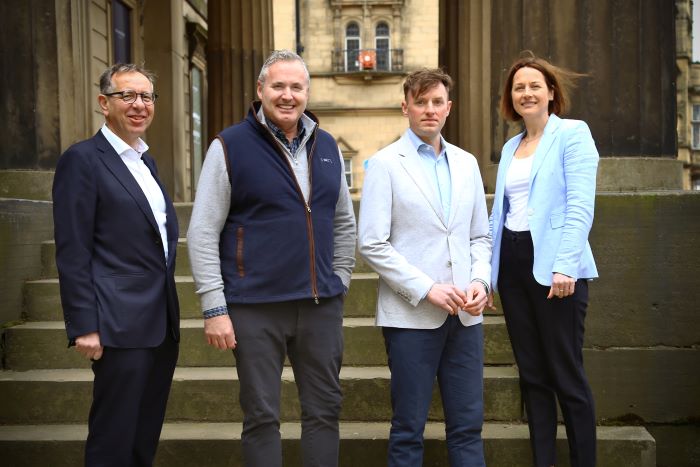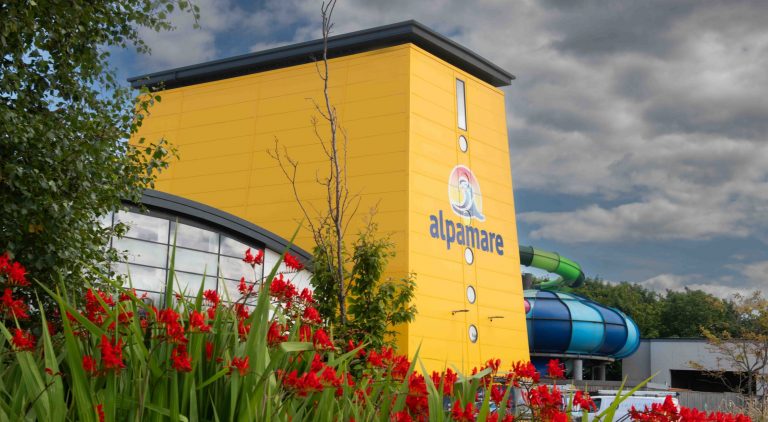Reward appoints relationship manager to support business growth across Yorkshire
Alternative finance lender, Reward Finance Group, has further supported its expansion aims across Yorkshire by appointing an experienced relationship manager to join the team at its Leeds head office.
Anthony Cope has been appointed to meet the needs of Reward’s growing client portfolio in the region, having worked within the financial sector for over 25 years. He spent the majority of his career in a similar client-facing role at Yorkshire Bank (now Virgin Money) before recently moving into the growth funding space at The FSE Group.
With Reward providing property investors and SMEs with tailored business finance loans and asset based solutions of up to £5m, Anthony will primarily be tasked with supporting new clients on a face-to-face basis with their ongoing borrowing requirements.
Commenting on his new role, Anthony said: “Reward is one of the largest and most established alternative finance lenders across the UK and on a terrific growth path, so I jumped at the opportunity to be part of its success.
“Having spent so much time in the banking sector, I’ve seen first-hand the pressures and obstacles SMEs face when trying to access finance and the critical role alternative lenders like Reward play in providing fast and flexible funding solutions to meet that need.
“I’m looking forward to working closely with our clients across the region and supporting them along their borrowing journey, to help them unlock further business opportunities and growth.”
Chris Ibbetson, Reward’s regional operations manager, added: “Our entire business is built on forging strong relationships, especially across our SME and property investor client portfolio, and so Anthony is a key appointment.
“He brings a wealth of financial and client services knowledge and experience to the role which will further bolster our expansion plans and hugely talented team in our Leeds head office.”
Accountancy practices merge in welcome boost to Wakefield and surrounding area
Streets Chartered Accountants, a top 40 UK professional service firm, has announced the establishment of Streets Andrew Wright Chartered Accountants.
The announcement follows the merger of the Wakefield practice, Andrew Wright & Co with the fast-growing multi regional practice, Streets Chartered Accountants.
When asked about the merger, Sally Wright, Managing Director, said: “Fellow Director Richard Farndale and I are delighted and excited about the merger. Our practice was founded in 1975 by my father Andrew Wright and over the years the practice has grown based on our reputation and the demands of clients in and around Wakefield.
“As with any business we cannot stand still and to overcome the challenges we and our clients face we need to develop our business. We looked for some time to find a perfect partner to support us and one with which we mutually share the same values and we believe we have found that in Streets. Certainly, there is a great match, both in terms of client focus and cultural fit.
“Now that Andrew Wright & Co is part of a larger practice, we can confidently promise greater continuity of service to our clients and improved career prospects for our team, as well as to those looking to enter the profession and new roles locally.
“We also believe that our clients will benefit in that the combined firm will be able to offer a wider range of services including areas of specialist corporate and private client tax planning, banking and finance, international advice, personal financial planning and even a virtual finance office.
“As a result of the merger, we are also now able to undertake statutory audits for larger clients, as well as businesses and organisations across West Yorkshire.”
Looking at what the merger means to Streets, the firm’s Managing Partner, Paul Tutin, said: “With Streets’ long established office in Hull it seemed a logical move to look for further practices across greater Yorkshire as we are keen to establish the firm as a leading player across the region.
“We were therefore delighted to enter into a conversation with Andrew Wright & Co. Very early on in our discussions it was clear that we shared the same vision and values for the profession and for supporting our clients.
“We are really looking forward to working with Sally and Richard to grow the practice and to further establish it as a pre-eminent accountancy, business and tax advisory firm servicing the needs of businesses and individuals across West Yorkshire.
“The merger of Andrew Wright & Co follows on from a number of others with Streets over the last 18 months including practices in Colchester, Bristol and Banbury. This, along with the opening of new offices in Burnley, Lancashire and Lichfield in the West Midlands as well as continued organic growth, has enabled us to achieve revenue of £35m. Looking ahead, with a number of further mergers and acquisitions in the pipeline which include further practices across Yorkshire, we are on track to achieve our target revenue of £40m by the end of the year.
“In line with the firm’s growth plans, we have also made a number of key appointments, including that of Simon Jones as our Deputy Chair and Paul Birch as the firm’s first Chief Operating Officer. Both are highly experienced individuals with established track records for developing successful organisations.
“These new roles, along with existing ones including that of our Group Finance Officer Josh Woods and other members of the senior leadership team, will continue to play a key and pivotal role in realising our goals to become a truly UK practice – one that offers and delivers excellent client service, innovation and advice, as well as being a great place for our colleagues to work and pursue their careers.”
Streets Law, the firm’s dedicated corporate and commercial law offering led by Managing Director and Solicitor, Adam Aisthorpe, undertook the legal work on behalf of Streets for the merger, including drafting the sale and purchase agreement and dealing with the due diligence process in collaboration with internal colleagues in the tax and audit teams at Streets.
Hull’s historic bombed cinema to get new lease of life as restoration work starts
The restoration of a derelict Grade II listed cinema in Hull is now underway.
The National Picture Theatre on Beverley Road, which still bears the scars of a World War Two bombing raid, will be given a new lease of life.
The cinema was the “last surviving civilian bomb-damaged building” from the period and was granted Grade II listed status in 2007, due to its significance.
With 1,050 seats and balcony, the cinema was long and narrow and opened on 23 December 1914.
Local contractor, Hobson and Porter are undertaking the restoration of the site, thanks to funding from The National Lottery Heritage Fund, Hull City Council and the National Civilian World War II Memorial Trust (NCWW2MT).
Works to preserve the site for future generations include the replacement of period windows, stabilisation and restoration of the red brick façade and new lighting.
The open space where the auditorium once stood will be used to create a flexible education and community events area and war memorial, enabling visitors to learn about the life of civilians in the Second World War.
The project has been long campaigned for by the National Civilian World War II Memorial Trust (NCWW2MT), who are passionate about sharing the impact the Second World War had on civilians in Hull, and how this site reflects just how much Britain’s second most bombed city in the UK was affected.
Councillor Rob Pritchard, Portfolio Holder for Culture and Leisure, said: “I am delighted to see work starting on site. Once complete it will, for the first time since it was destroyed in World War II, enable visitors to access the building safely.
“There are so many stories within the National Picture Theatre that are of national importance, and to have the opportunity to give it the attention it deserves is fantastic.
“I would like to thank The National Lottery Heritage Fund for recognising the significance of this project and the local community for their continued support now and going forward.
“I am looking forward to seeing the restoration progress.”
Hobson and Porter’s Managing Director, Richard Hunter, said: “Having been based in Hull since 1971, we have seen the cinema sadly fall into a sorry state and feel hugely proud to have been chosen to restore such a significant, historic landmark in the city.
“In recent years we are proud to have worked with Hull City Council on a number of heritage projects in the city including the recommissioning of the iconic Guildhall time ball, the refurbishment of Beverley Road baths and the repurposing of the former city archives at 79 Lowgate.”
Helen Featherstone, Director, England, North at The National Lottery Heritage Fund, said: “It’s very exciting to see work on the National Picture Theatre get underway. This project will not only restore and preserve the heritage building for future generations, it will also connect visitors from near and far with its unique story.
“We’re very proud that, thanks to National Lottery players, the Heritage Fund is able to support multiple projects in Hull that, like this one, are contributing to the city’s ongoing, heritage-led, cultural renaissance.”
The cinema, which was designed by architects Runton and Barry for the De-Luxe Theatre Company and built in 1914, was badly damaged during a Luftwaffe air raid on 18 March 1941. At the time, more than 150 people were inside, but no-one was killed or seriously injured.
Hull was one of the worst-affected cities in the country during the Blitz and had to face air raids for longer than any other place in Britain.
Once restoration is complete, the history of the cinema will be told and become an educational facility and a place to remember loved ones. The restoration programme is expected to take around five months to complete.
Real estate investment forum generates £21m in West Yorkshire, says independent report
An independent report by ARUP has highlighted that the UK’s Real Estate Investment and Infrastructure Forum, a major event taking place annually in Leeds, has generated almost £21m of local economic activity in the city and the wider West Yorkshire region in 2024.
The event, which brought together over 13,000 official attendees in 2024, has now generated £38.5m since it began in 2022.
Nathan Spencer, Director of UKREiiF, said: “We’ve always wanted UKREiiF to be more than just an event – year round we’re looking at ways to benefit the community in West Yorkshire, and part of our marketing activity before the event was looking at much more than just growing the attendance in terms of numbers, we were reviewing how to get people spending more time in the region, and how we can get them to return more frequently.
“We’re delighted to continue our work with ARUP to showcase the truly incredible results UKREiiF is having on the local economy, and we look forward to hosting the event in the city once more in 2025.”
Key highlights from the report include:
- £38.5m economic boost since 2022 (£5.5m 2022, £12.1m 2023, £20.1m 2024)
- 41% of delegates staying for 2 nights in the city region (up from 38% in 2023) and 25% of delegates staying for 3 nights in the city region (up from 22% in 2023)
- 3.5% of delegates staying for 4 or more nights in the city region (up from 3.1% in 2023)
- 33% of people attending UKREiiF are now visiting Leeds more frequently between each event ‘due to the event’
Large firms mustn’t ‘capture’ new skills co-ordination. body, says FSB
According to Tina McKenzie, Policy Chair at the FSB, more co-ordination is welcome, but delivery is what counts. She said: “Small firms will want to see real safeguards put in place so the new body is not ‘captured’ by large employers.
“The Government’s policy on a new skills levy has significant risks for overall apprenticeship numbers and training opportunities in small firms.
“Labour’s commitment in Opposition to continue current levels of co-investment in apprenticeships must now be formally adopted by Ministers so further decline in numbers can be avoided. Skills England should be tasked with increasing the number of small business apprenticeships year on year.
“Small businesses were enthusiastic early adopters when it comes to apprentices – we want to see this new body overcome the real flaws in curriculum design which have been such a significant factor in apprenticeship decline.
Scarborough economy gets a boost with water park re-opening
Scarborough’s Alpamare water park re-opens to the public tomorrow after a massive effort between North Yorkshire Council and Flamingo Land.
Staff have been working round the clock to get the site ready for customers once more after it was closed last December when the previous operator went into administration.
Flamingo Land CEO Gordon Gibb said: “This opening would not have been possible without a super-human effort from our team and fantastic support from North Yorkshire Council. Without the council team’s professionalism and commitment, this would not have been possible.
“We are now looking forward to welcoming visitors to this amazing attraction for Scarborough, which will be a huge boost for the resort’s summer season.”
Deputy leader Gareth Dadd added: “The park is a massive asset for the town and securing Flamingo Land as the operator is key to its success. It is great to be working with a well-established, local and trusted company.”
The North Bay attraction boasts a wave pool, a splash and play pool, four state-of-the-art slides, two outdoor pools and a café and terrace bar. It was purpose-built in 2016 overlooking North Bay in the seaside town. Its’ alpine themed spa and treatment area will open at a later date.
The council took possession of the site in December last year when tenant Benchmark Leisure went into administration. Now that Flamingo Land has taken on its short-term operation, work to find a permanent solution on the future operation of the site will begin.
Mitie acquires Scunthorpe-based ESM Power
Scunthorpe-based ESM Power is to be acquired by Mitie, and become part of its Projects business from August 1st.
ESM Power, based on North Farm Road in Scunthorpe, will officially join Mitie’s Projects business from 1 August, where it will help customers connect, upgrade, and decarbonise their buildings and estates across the UK.
The company’s MD Roger Bamford said: “We are incredibly proud of the ESM Power team and the business we have built over the past 20 years. We are excited to join the Mitie team, share our expertise, and benefit from the opportunity to work with Mitie’s experienced colleagues and extensive customer base to grow our business.
“The ESM Power senior management team will be remaining in the business, and be fully committed to the next phase of growth for ESM Power. We will continue to focus on delivering the agility and quality of a small business, built on trust and customer relationships, but with the backing and stability of Mitie as a £4.5 billion FTSE 250 business.”
Spencer bridge team wins award for work to preserve historic ‘international’ bridge
Spencer Bridge Engineering has won the Historic Bridge Project of the Year Award at the New Civil Engineer Bridges Awards 2024 for its work on the Union Chain Bridge crossing the border between England and Scotland.
Opened in 1820, Union Chain Bridge crosses the River Tweed. It’s the world’s oldest suspension bridge still carrying traffic and was the longest wrought iron suspension bridge in the world when it opened.
Joe DiMauro, Engineering Director said: “We’re incredibly proud to have been honoured with prestigious industry awards for our work on Union Chain Bridge.
“This recognition further reinforces Spencer Bridge Engineering’s reputation as an industry leader in specialist bridge works, including the delivery of projects on historic structures.
“Our expertise, experience and wide-ranging capabilities across the company mean we can be trusted to complete complex bridge works to exceptional standards. I’d like to thank the team for their tremendous work which made this project so successful and these awards possible.”
Designed and built by Royal Navy officer and bridges design pioneer, Captain Samuel Brown, the crossing was credited with being a catalyst for bridge innovation and influenced the design and construction of suspension bridges around the world.
Spencer Group was appointed by Northumberland County Council to dismantle the bridge and carry out a complete refurbishment and rebuild, ensuring the 200-year-old structure continues to provide safe passage for vehicles, pedestrians and cyclists for many years to come.
A key element of the project was to ensure all modifications were in keeping with the heritage and historical significance of the bridge and, where possible, structural elements, including the main suspension chain rods, links, pins and hanger caps, were refurbished rather than replaced.
The existing masonry towers were also refurbished using stone from the same quarry that was originally used. Working in partnership with local stonemasons and heritage bodies, the Spencer Bridge Engineering team conducted masonry trials to determine the exact stone facing and pointing techniques required to best match the existing structure.
Draft designs approved to change the face of Cleethorpes
Draft designs that will change the appearance of Cleethorpes Market Place and Pier Gardens with the help of an £18.4m government grant have been agreed, and detailed designing can now begin.
The centre of the Market Place is to be pedestrianised for parts of the day, allowing for cafes and public events. This will swallow up most of the parking spaces, though lay-bys and drop off zones will still feature in the plans within Market Place to make sure businesses have access for deliveries.
Additionally, changes are being progressed to convert High Street Car Park into a short stay only car park. The unused land behind the Old Vic pub, is also proposed to be converted into a public car park of around 40 spaces.
Council leader Cllr Philip Jackson said: “We are having discussions with businesses. We know that there are concerns, but we’ve also seen in other areas across the country what these sort of projects do to help local economies, and what the possibilities are.”
The Pier Garden design harks back to the historic use of space, where people went to spend time. The new vision brings people of all ages and abilities together, and creates a more family orientated area, alongside areas for quiet reflection and education, whilst also increasing biodiversity in the resort.
The design proposes a “zoning” system, which will provide a mixture of uses across the park with a consistent theme throughout.
- arrival space at Sea Road/Alexandra Road junction, creating a welcoming space to the gardens;
- events zone to support a mixture of activities/events that could take place;
- play/recreation zone which would consist of a larger central space and provide a mixture of activities for young and older children alike;
- reflection zone at the Sea View Street end of the gardens supporting the existing armed forces memorials that are situated there.
New Chair for Boston Town Board
Joanna Brigham has been announced as the new Chair of Boston Town Board.
Joanna, a highly experienced senior leader who has held Chief Executive and Director roles within a broad range of organisations, assumes the role after former Chair Neil Kempster decided to step down.
Joanna’s appointment comes as the Boston Town Board begins a new phase in its existence having been repurposed to oversee the delivery of £20m Long Term Plan for Towns funding awarded to Boston.
This additional funding complements the £21.9m Town Deal funding which is being invested in Boston through a number of transformational projects, including the new Mayflower learning centre at Boston College and improvements to the Geoff Moulder Centre.
Joanna, who was also most recently Chief Executive of UK Shared Business Services Ltd and previously CEO for the Scottish Police Services Authority, and Director of Strategy and Marketing for the Royal Parks said: “I am so pleased to have been appointed to lead Boston Town Board through its next chapter, when we will build on the successful and significant progress to date and look to the future by creating and overseeing the implementation of a long term plan for Boston.
“I would like to thank my predecessor Neil who has held the position of chair almost from the very beginning. I look forward to continuing to work with him and all the board members as we bring together our shared skills, commitment, and ambition for Boston to make a difference for the town.”
Neil, who is Land and Development Director of Chestnut Homes was an inaugural member of the Board and has been Chair of the Boston Town Board since June 2020. During his four years at the helm, the Board’s role expanded after further funding including Levelling Up and more recently Long Term Plan for Towns investment was awarded to Boston.
Neil said: “It has been a privilege to serve as Chair for the Boston Town Board, and to be involved in shaping the town investment plan and projects ever since the announcement of the funding.
“Following the establishment of the Boston Town Board in 2020, which enabled the Boston Town Deal investment of £21.9 million, we have supported significant further funding and investment into Boston.
“This has included Levelling Up and Levelling Up Partnership, match funding for the Town Deal, UK Shared Prosperity Funding, High Street Task Force support and most recently the Long Term Plan for Towns funding.
“Now, with the changes in the board’s role, it feels like the right time for me to step down. I am looking forward to remaining as a board member, and continuing to work with Jo and the other board members. I wish Jo all the very best in her role as Chair.”
Councillor Anne Dorrian, Leader of Boston Borough Council, said: “I think I speak for all the partner organisations who are represented on the Town Board when I say that Neil’s chairmanship over the last four years has given a steady and stable influence, giving oversight to the important major projects of the Town Deal.
“I am delighted that he has chosen to stay on as a board member and is willing to offer his vast wealth of experience as we move forward with the Long Term Plan for Towns.”












